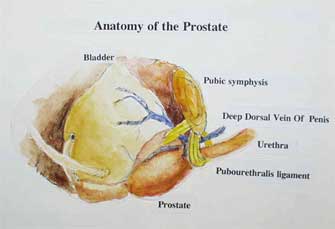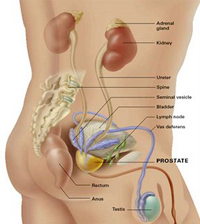Prostate Cancer
Approximately 27,000 men die annually due to prostate cancer making it the second most fatal cancer in men. Advances in the early detection and treatment of this disease are believed to have sharply increased survival. Use of the blood test, prostate specific antigen PSA and methods for accurate biopsies of the prostate gland (Trans Rectal UltraSound or TRUS) have allowed earlier and more accurate detection.
In fact, prior to 1990 and the introduction of the PSA blood test, the annual death rate from prostate cancer was 41,000 and since 1995 the prostate cancer death rate steadily dropped to its present level of 27,009. The Orange County hospital has increased awareness for new advances in prostate treatment which range from short stay surgery (2-3days), with continence rates >90%, for surgery; to new radioactive non-surgical "seed" implants accurately placed by TRUS; and hormone therapies of greater ease.
Ten year prostate cancer specific survival rates with radical prostatectomy (open or robot-assisted ) are greater than 95% for low grade adenocarcinomas, greater than 85% for medium and high grade adenocarcinomas. Early detection of prostate cancer is strongly believed to significantly increase long term survival rates.
Who Should Be Screened for Prostate Cancer?
It is recommended that healthy men starting at 50 years of age should be screened for prostate cancer with an annual Digital Rectal Exam (DRE), and a PSA blood test. Controversy exists as to what is a normal PSA. The Orange County hospital shows that most studies now demonstrate that a PSA level above 2.5 ng/ml is elevated. In fact, men in their 40s should have a PSA test less then 1.0 ng/ml.
The OC hospital urges men to consult their family physician to see if they are due for a screening. Difficulty urinating due to an enlarged prostate could be an early warning sign that it's also time for a screening. Prostate cancer is very rare in men under the age of 40, but not unheard of. Several groups have been found to be at a higher risk for prostate cancer.
Brothers or sons of men with prostate cancer carry a 2 to 9 time's higher risk of disease. Also, African-Americans carry a higher risk than the average population of 2 to 5 fold. It has been recommended that both groups should consider screening for prostate cancer at age 40-45. Patients who do not have family physicians, and are concerned about prostate cancer, should note that late September is Prostate Cancer Awareness Week.
The UC Irvine Medical Center as well as other hospitals participates in a national week of prostate cancer screening by offering DRE exams and PSA testing. Prostate cancer new treatment options are discussed as a vital part of the education process.
What Is The Prostate Gland And What Does It Do?
The acclaimed UC Irvine Hospital in Orange takes pride in educating its patients in all aspects of prostate health. The prostate gland is normally the size of a walnut in the average 60-year old (approximately 40 ccs) and usually increases in size as men age into their 80's and 90's. The urethra is the structure which transports urine from the bladder through the prostate to the outside.
At the base of the bladder, the prostate gland surrounds the urethra. The prostate is a gland that helps reproduction as it makes the fluid, semen, that the sperm is transported. The seminal vesicles are also part of the male ejaculatory system and sperm is stored in the seminal vesicles until ejaculation occurs.
The prostate gland provides 80% of the ejaculatory fluid. The precise function of the prostate is poorly understood. It is thought that its secretions may produce anti-bacterial substances to prevent urinary infection and possibly other secretions may play a role in fertilization. Nerves that control erection run along the outside of the prostate gland, and usually can be preserved during surgery. This is called a nerve-sparing prostatectomy and is usually more successful in younger patients.
Common Questions about Prostate Cancer
1. I have urinary symptoms, should I be worried about prostate cancer?
No. Symptoms of frequency, day and at night, urgency, intermittent stream, and incomplete emptying are relatively common and increase with age. The most common cause is Benign Prostatic Hypertrophy or BPH (i.e. non-malignant or non-cancerous). Benign enlargement of the prostate does not cause or lead to prostate cancer, but both can and do occur at the same time.
Treatment of BPH generally starts with oral medications called alpha-blockers to relax the muscle around the prostatic urethra which is very highly effective in improving the force of the urinary stream and reducing symptoms. Infection of the prostate gland can also occur, a condition called Prostatitis, that causes urinary symptoms, sometimes fever and may significantly elevate the PSA. Treatment usually calls for about 30 days of antibiotics. Or should consult with their family physician to determine what the cause of symptoms may be.
2. I have NO urinary symptoms, should I be worried about prostate cancer?
No. Prostate cancer usually occurs without causing urinary symptoms. The only means to identify prostate cancer early is a digital rectal exam and PSA testing. When urinary symptoms are present in prostate cancer (which is infrequent) the disease is usually advanced.
More information can be found at:
Medline Prostate Cancer Site
National Cancer Institute
Prostate Cancer at Yahoo! Health
Prostate.com
Prostate Cancer Foundation
Cancer Information Network
